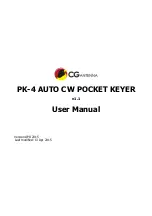
1. Introduction
Extremely small size and extremely low power consumption electronic keyer, Pocket Keyer, offers
an Iambic keying with 4 message memories. The current drain is approximately 160 µA at 3 V, and
can be continuously powered by a pair of UM4 batteries for a couple of months. Four message but-
tons are mounted on the panel, and you can recall memorized messages quickly. Simply press one
of the four buttons to recall the message.
Four messages (1 – 4) are stored into non-volatile EEPROM that keeps the contents without power.
Message No. 4 has Auto Repeat Message function with programmable pause time.
Selectable keying weight
Keying weight (ratio of dot and dash) can be set to 3, 3.5, 4 or 4.5 by simple operation of Memory
buttons.
Low noise generation
Micro Control Unit (PIC16F62SA) of PK-4 runs at a very low clock frequency – around 160 kHz. It
generates much less noise than a high frequency clocked processor.
2. Specifications
Keying Type
Iambic B mode, Straight key mode
Keying speed
Approx. 8 to 50 WPM
Weight
4 selectable weight levels; 3 3.5 4 4.5
CW messages
Message 1: 40 characters,
(nonvolatile)
Message 2: 20 characters,
Message 3: 20 characters,
Message 4: 40 characters, Auto Repeat function,
(Note: Above character numbers include space.)
Side tone
Built in piezo-electric Speaker
Power requirement
2.5 – 6 V DC, typical 2 × AAA batteries
3. Turn on the Pocket Keyer
When you first turn on the Pocket Keyer, the weight is set to 3.5, side tone is enable and the keyer
is ready for Iambic keying. Adjust the SPEED knob for desired keying speed.
4. Record Messages
Keep pressing the MEMORY button for about 1 second. REC LED will brighten continuously. Then
release the REC button.
Short press one of the four message buttons 1, 2, 3 or 4. REC LED will be turned off.
Then enter a message with your paddle. You have to input CW code correctly. Otherwise PK-4 will
stop recording; e.g. You want to input CQ. So you paddle '
-·-· --·-
', but accidentally you paddle
'
---- ––·-'
. Because '
----
' isn't a correct Morse code, PK-4 cannot recognize it. Therefore it will
stop recording. So '
--.-
' Q and follow letters will be not recorded.




